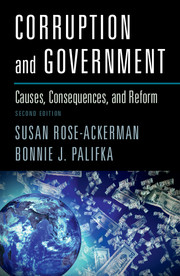Book contents
- Frontmatter
- Dedication
- Contents
- List of Figures
- List of Tables
- List of Boxes
- List of Acronyms
- Preface to the First Edition (1999)
- Preface to the Second Edition
- Acknowledgments
- INTRODUCTION
- PART I CORRUPTION AS AN ECONOMIC PROBLEM
- PART II CORRUPTION AS A CULTURAL PROBLEM
- PART III CORRUPTION AS A POLITICAL PROBLEM
- 8 Politics, Corruption, and Clientelism
- 9 Organized Crime, Corruption, and Money Laundering
- 10 Corruption in Postconflict State Building
- 11 Democracy: Corruption, Connections, and Money in Politics
- 12 Accountability beyond the Ballot Box
- PART IV REFORM AGENDAS: DOMESTIC POLITICAL WILL AND INTERNATIONAL INFLUENCE
- CONCLUSIONS
- References
- Index
12 - Accountability beyond the Ballot Box
from PART III - CORRUPTION AS A POLITICAL PROBLEM
Published online by Cambridge University Press: 05 March 2016
- Frontmatter
- Dedication
- Contents
- List of Figures
- List of Tables
- List of Boxes
- List of Acronyms
- Preface to the First Edition (1999)
- Preface to the Second Edition
- Acknowledgments
- INTRODUCTION
- PART I CORRUPTION AS AN ECONOMIC PROBLEM
- PART II CORRUPTION AS A CULTURAL PROBLEM
- PART III CORRUPTION AS A POLITICAL PROBLEM
- 8 Politics, Corruption, and Clientelism
- 9 Organized Crime, Corruption, and Money Laundering
- 10 Corruption in Postconflict State Building
- 11 Democracy: Corruption, Connections, and Money in Politics
- 12 Accountability beyond the Ballot Box
- PART IV REFORM AGENDAS: DOMESTIC POLITICAL WILL AND INTERNATIONAL INFLUENCE
- CONCLUSIONS
- References
- Index
Summary
Public accountability is necessary for the control of corruption. Both autocracies and democracies can be deeply corrupt, and each can be held accountable in different ways. Elections can constrain politicians, but, as we have seen, they are an imperfect tool. Public accountability is possible even in countries without elections or with a dominant party that always wins the vote. These constraints may be more difficult for autocrats to accept than for elected officials, but even democratic officials resist reforms that expose them to public scrutiny and criticism. Corruption can be limited by internal government structures and organizations that constrain malfeasance and by outside pressure from the public.
Limits on the power of individual politicians and political institutions, accompanied by independent monitoring and enforcement organizations, can be potent anticorruption strategies that also constrain other forms of self-dealing. In a democracy, a key institution is the separation of powers between the legislative and executive branches that permits each source of power to check the other (Section I). Even if elections are unimportant, an independent judicial and prosecutorial system and a federal structure can limit the power of political leaders. But the decentralization of political power is not necessarily effective. Under some conditions, a system with multiple veto points is particularly subject to improper influence, and a federal system may simply give state and local political leaders the leeway to enrich themselves at public expense (Section II). Independent sources of prosecutorial and judicial power are less problematic although, of course, these institutions must also be largely free of corruption and patronage. Some degree of independence is necessary but not sufficient, and too much independence can breed impunity (Section III).
Another group of reforms increases the openness and accountability of government to outside scrutiny (Section IV). Under this scenario, government collects and provides information; both the media and citizens’ groups operate freely, and groups and individuals have effective avenues for challenging official actions. Although such policies are likely to be more acceptable to democratically elected leaders, these reforms can also have an effect in undemocratic systems whose leaders nevertheless need public support to retain and exercise power.
Accountable Implementation
Legislatures frequently delegate implementation to the executive and often voluntarily limit their own control over executive policy making and implementation. The statutes leave the development of precise standards to government agencies, but may include detailed procedural requirements (Moe 1990; Rose-Ackerman 1992: 33–96).
- Type
- Chapter
- Information
- Corruption and GovernmentCauses, Consequences, and Reform, pp. 374 - 412Publisher: Cambridge University PressPrint publication year: 2016



